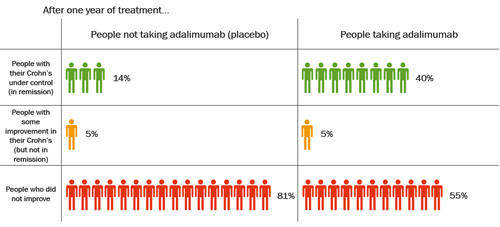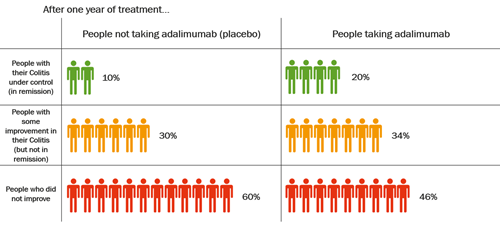Fertility
Adalimumab is not thought to affect male or female fertility. If you do not want to get pregnant you should use contraception.
Contraception
Your contraception will not be affected by adalimumab and will work as normal. This includes:
- The combined pill
- Progesterone-only pill
- Emergency contraception
However, if adalimumab makes you vomit, contraceptive pills may not be as effective and may not protect you from pregnancy. If you are sick, check the information that comes with your contraceptive or speak to a pharmacist.
Planning a pregnancy
Speak to your IBD team if you are offered or are taking adalimumab and want to start a family. They can help you make an informed decision about your care and your baby's safety.
Do not stop taking your medicine without talking to your doctor first.
Stopping your medicine may increase your risk of a flare-up. Having active Crohn’s or Colitis can increase the risk of pregnancy complications, such as:
- Premature birth
- Low birth weight
- Miscarriage
This is why it is important to keep your condition under control during pregnancy.
Adalimumab is generally considered safe to take during pregnancy. Research shows that it is not likely to affect your pregnancy or harm an unborn baby. Long-term health, infection rates and development do not appear to be affected in children with a parent who took medicines like adalimumab, during pregnancy. This includes mothers who took these medicines until birth.
It is possible for adalimumab to cross the placenta and enter your baby’s blood. This may mostly happen in mid to late pregnancy, during the late second and third trimester. To be cautious, drug companies advise using contraception to prevent pregnancy while taking adalimumab and for at least five months after your last dose. They also suggest that adalimumab should only be used during pregnancy if needed to keep your condition under control.
However, many people will be advised by their healthcare professionals to continue taking adalimumab throughout their pregnancy. This can help manage their condition effectively and reduce flare-ups. Flare-ups can increase the risk of pregnancy complications.
If your Crohn’s or Colitis is well controlled, your IBD team may advise you to take adalimumab for the first six months of your pregnancy only. This aims to reduce exposure to your baby. If your condition is not well controlled, your IBD team may recommend you take adalimumab throughout your pregnancy.
If you have an unplanned pregnancy
Contact your IBD team straight away if you are on adalimumab and find out you are pregnant. Do not stop taking your medicine until you have spoken to your healthcare professional.
Your baby and live vaccines
Tell your baby’s healthcare team if you took adalimumab during your pregnancy. If you did, you may be told that your baby should not have live vaccines until they are a bit older. This includes the rotavirus vaccine and the BCG vaccine for tuberculosis. The BCG vaccine is not routinely given as part of the NHS vaccination schedule but is sometimes recommended. For these vaccinations, you may need to wait until your baby is between five and 12 months old or until adalimumab cannot be found in the baby’s blood. But sometimes the benefit of giving a live vaccine earlier may be greater than the potential risk.
Taking adalimumab during pregnancy should not affect the rest of your baby’s vaccination schedule. You might want to discuss this with your IBD team and your baby’s healthcare team. Decisions on what vaccines your baby should have, and when, will be made on an individual basis. Your IBD team and midwife or baby’s healthcare team should be able to help you make a decision.
If you take adalimumab, you should take extra care if your baby has the rotavirus vaccine. Live virus can be shed in the baby’s poo for a few weeks. Make sure you wash your hands or wear gloves when changing their nappy.
There is some evidence that your baby may be more prone to infections if you take azathioprine or mercaptopurine along with other anti-TNF medicines, like adalimumab during pregnancy.
Discuss the risks and benefits of taking adalimumab while you are pregnant with your IBD team. You can also find out more in our information on pregnancy and reproductive health.




 Become a member: Find out about the benefits of joining our amazing community
Become a member: Find out about the benefits of joining our amazing community
